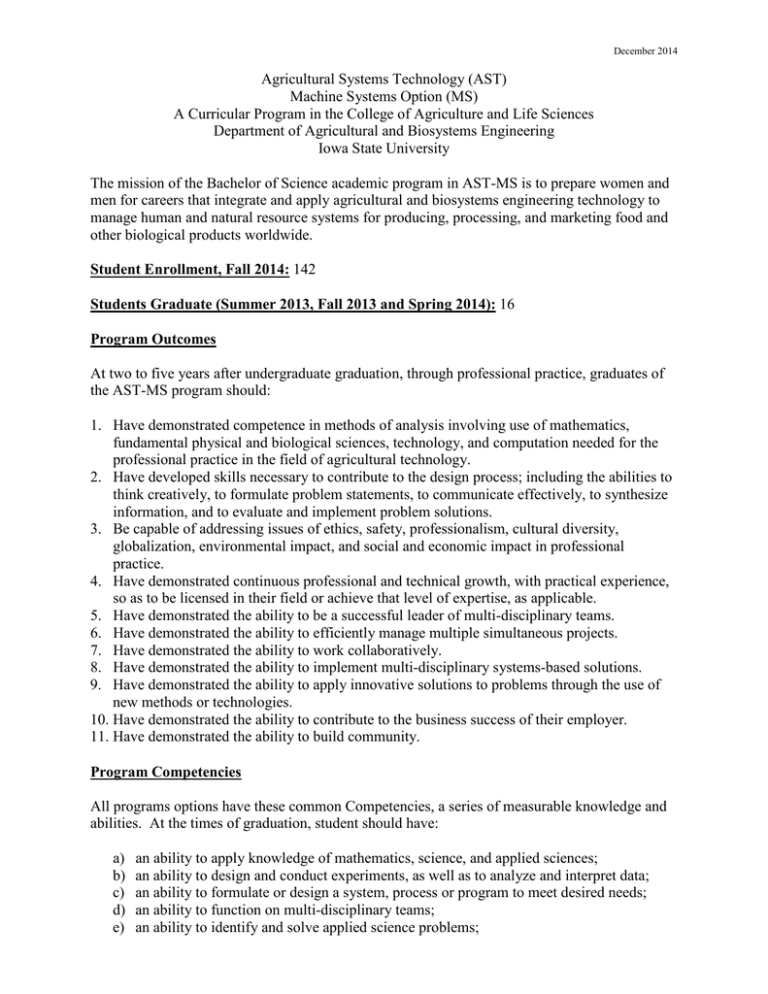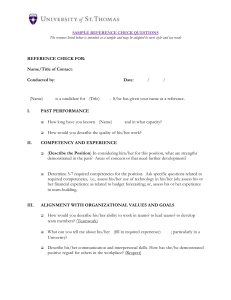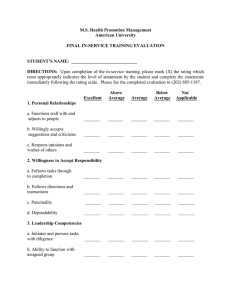Agricultural Systems Technology - Agricultural and Biosystems
advertisement

December 2014 Agricultural Systems Technology (AST) Machine Systems Option (MS) A Curricular Program in the College of Agriculture and Life Sciences Department of Agricultural and Biosystems Engineering Iowa State University The mission of the Bachelor of Science academic program in AST-MS is to prepare women and men for careers that integrate and apply agricultural and biosystems engineering technology to manage human and natural resource systems for producing, processing, and marketing food and other biological products worldwide. Student Enrollment, Fall 2014: 142 Students Graduate (Summer 2013, Fall 2013 and Spring 2014): 16 Program Outcomes At two to five years after undergraduate graduation, through professional practice, graduates of the AST-MS program should: 1. Have demonstrated competence in methods of analysis involving use of mathematics, fundamental physical and biological sciences, technology, and computation needed for the professional practice in the field of agricultural technology. 2. Have developed skills necessary to contribute to the design process; including the abilities to think creatively, to formulate problem statements, to communicate effectively, to synthesize information, and to evaluate and implement problem solutions. 3. Be capable of addressing issues of ethics, safety, professionalism, cultural diversity, globalization, environmental impact, and social and economic impact in professional practice. 4. Have demonstrated continuous professional and technical growth, with practical experience, so as to be licensed in their field or achieve that level of expertise, as applicable. 5. Have demonstrated the ability to be a successful leader of multi-disciplinary teams. 6. Have demonstrated the ability to efficiently manage multiple simultaneous projects. 7. Have demonstrated the ability to work collaboratively. 8. Have demonstrated the ability to implement multi-disciplinary systems-based solutions. 9. Have demonstrated the ability to apply innovative solutions to problems through the use of new methods or technologies. 10. Have demonstrated the ability to contribute to the business success of their employer. 11. Have demonstrated the ability to build community. Program Competencies All programs options have these common Competencies, a series of measurable knowledge and abilities. At the times of graduation, student should have: a) b) c) d) e) an ability to apply knowledge of mathematics, science, and applied sciences; an ability to design and conduct experiments, as well as to analyze and interpret data; an ability to formulate or design a system, process or program to meet desired needs; an ability to function on multi-disciplinary teams; an ability to identify and solve applied science problems; December 2014 f) an understanding of professional and ethical responsibility; g) an ability to communicate effectively h) the broad education necessary to understand the impact of solutions in a global and societal context; i) recognition of the need for, and an ability to engage in life-long learning; j) a knowledge of contemporary issues; k) an ability to use the techniques, skills, and modern scientific and technical tools necessary for professional practice; l) an ability to specify, manage, and test machine systems in the context of complete agricultural, biological production or processing systems; m) an understanding of the technology and application of machine systems including power and information flows, function and interaction with biological materials; and n) an ability to perform energy and cost analyses of complete machine systems to insure the success and sustainability of an enterprise Map of Workplace Competencies to Program Competencies (a) an ability to apply knowledge of mathematics, science, and applied sciences (b) an ability to design and conduct experiments, as well as to analyze and interpret data (c) an ability to formulate or design a system, process or program to meet desired needs (d) an ability to function on interdisciplinary teams (e) an ability to identify, formulate and solve applied science problems (f) an understanding of professional and ethical responsibility (g) an ability to communicate effectively (h) the broad education necessary to understand the impact of engineering solutions is a global and societal context (i) a recognition of the need for, and the ability to engage in, life-long learning (j) a knowledge of contemporary issues (k) an ability to use the techniques, skills, and modern scientific and technical tools necessary for professional practice Customer Focus Professional Impact Integrity Teamwork Communication Planning Analysis and Judgment Cultural Adaptability Innovation Initiative Quality Orientation Continuous Learning General Knowledge Iowa State University AST-MS Program Competencies Technical Knowledge Workplace Competencies

